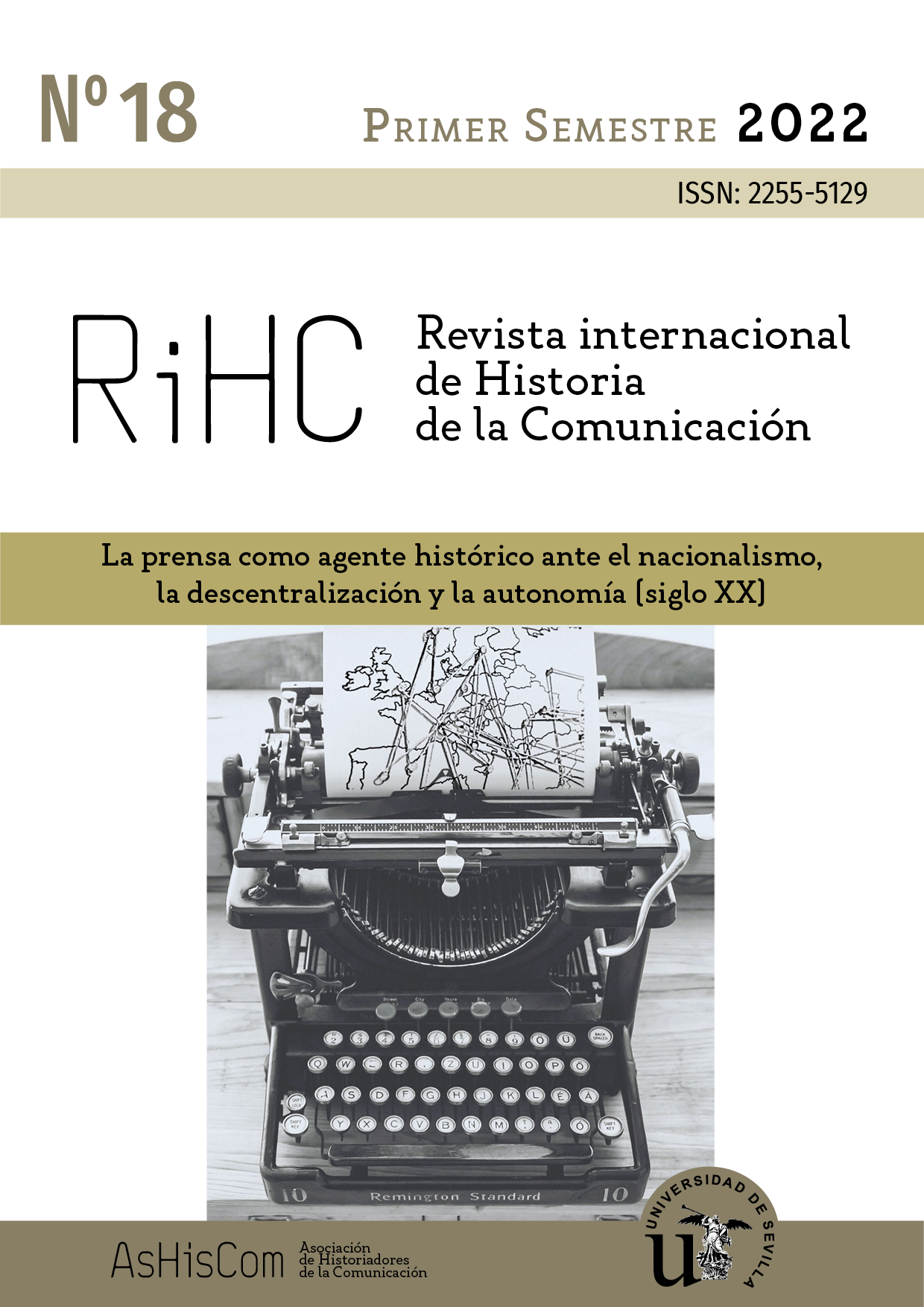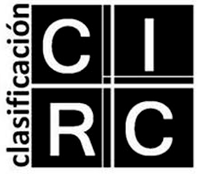Languages Plurality In The Spanish Transition To Democracy: a Priority Question For Spanish Periodicals?
DOI:
https://doi.org/10.12795/RiCH.2018.i18.05Keywords:
Informative periodicals, Cambio16, Posible, Guadiana, Doblón, Weekly magazineAbstract
The period between the death of Franco and the approval of the Spanish Constitution proved that several claims were being done by Spanish society. The democratization of the country would only be possible through free elections, an amnesty and the recognition of regional particularities. In this sense, the new press that emerged during the liberalizations carried out by Franco’s dictatorship between 1966 and 1974 strengthened these requests, but at the same time established an order of priorities. This article analyzes the contents of the main information periodicals (Cambio16, Doblón, Posible and Guadiana) towards the linguistic plurality and its possible recognition. From this point, this text targets a triple aim: to demonstrate that the territorial claim played a secondary role in the editorial content of these publications; to demonstrate how these publications preferred the reports as a formula to claim linguistic recognition; and specify the position of the abovesaid weekly informative magazines towards the linguistic plurality and to know the differences of opinion between them.
Downloads
References
BARRERA DEL BARRIO, C. (1995): Sin mordaza. Veinte años de prensa en democracia, Madrid, Temas de Hoy.
BERAMENDI GONZÁLEZ, J. (2003): “Nacionalismos, regionalismos y autonomía en la Segunda República”, en Pasado y Memoria. Revista de Historia Contemporánea, nº 2, pp. 53-82. https://doi.org/10.14198/PASADO2003.2.03
CASTRO, C. (2010): La prensa en la transición. 1966-1978, Madrid, Alianza.
CARRILLO, M. (2001): “El marco jurídico político de la libertad de prensa en la Transición a la democracia en España”, en Historia constitucional: Revista Electrónica de Historia Constitucional, nº 2, pp. 1-42.
CLARET, J. (2017): “El «problema catalán» durante la primera Transición”, en Ayer, nº 106 (2), pp. 265-289.
DAVARA TORREGO, J. (2004): España en portada, Madrid, Fragua.
DE LA GRANJA SAENZ, J.L. (2007): “El nacimiento de Euskadi: el Estatuto de 1936 y el primer gobierno vasco”, en Historia Contemporánea, nº 35, pp. 427-450.
DEL VALLE, J. (2013): A Political History of Spanish: The Making of a Language, Cambridge, Cambridge University Press. https://doi.org/10.1017/CBO9780511794339
DÍAZ DORRONSORO, J.M. (2012): Cambio 16. Historia y testimonio de la mítica revista de la Transición democrática española, en el 40 Aniversario de su fundación. Madrid, Ed. Leer/Artículo XIX.
FONTES DE GARNICA, I. Y MENÉNDEZ, M.A. (2004): El Parlamento de papel: las revistas españolas de la Transición democrática, Madrid, APM.
GARCÍA MARTÍN, J.A. (2019): "Doblón: un semanario económico para tiempos de cambio político", en Historia Actual Online, nº 48 (1), pp. 117-118.
GARCÍA MARTIN, J. A. (2016): Cambio16 y la Transición española. Una voz autorizada. Madrid, Akrón-Csed.
GÓMEZ MENDOZA, M.A. (1999): “Análisis de contenido cualitativo y cuantitativo: definición, clasificación y metodología”, en Revista de Ciencias Humanas, nº 20.
GUILLAUMET LLOVERAS, J., GARCÍA-CARRETERO, L., SANMARTÍ ROSET, J.M., y REIG CRUAÑES, J. (2018): "Información, política y partidos durante la Transición española. Análisis de las revistas de información" en Estudios sobre el mensaje periodístico, nº 24 (2), pp. 1339-1352. https://doi.org/10.5209/ESMP.62220
GUNTHER, R., MONTERO, J.R. y WERT, J.I. (2000): “The Media and Politics in Spain: From Dictatorship to Democracy”, en GUNTHER, E. y MUGHAN, A. (Eds.), Democracy and the media: a comparative perspective. Cambridge, Cambridge University Press, pp. 28-84. https://doi.org/10.1017/CBO9781139175289.002
IGLESIAS FRANCH, N. (2019): “Análisis crítico de las informaciones sobre las lenguas publicadas en la prensa española de la Transición”, en Estudios sobre el mensaje periodístico, nº 25(2), pp. 901-914. https://doi.org/10.5209/esmp.64815
MONTERO, M., RODRÍGUEZ VIRGILI, J., y GARCÍA-ORTEGA, C. (2008): “La construcción mediática de la comunidad política. La prensa en la transición española a la democracia”, en Palabra Clave, Vol. 11, nº 2, pp. 293-309.
NINYOLES, R.L. (1977): Cuatro idiomas para un Estado: el castellano y los conflictos lingüísticos en la España periférica, Madrid, Editorial Cambio 16.
NÚÑEZ SEIXAS, X.M. (2018): España en democracia, 1975-2011, Barcelona, Marcial Pons.
OROBON, M.A. (2014): “Lenguas y naciones en las Cortes Constituyentes de la II República: la visión castellana”, en Investigaciones Históricas, nº 34, pp. 185-209.
PALOMARES, A.S. (2014): Siempre llega la noche, Barcelona, Ediciones B.
REGUERO SANZ, I. y PELAZ LÓPEZ, J.V. (2020): “La cuestión territorial en los inicios de la Transición a la democracia en España: reflexiones sobre un debate político y periodístico (1977–1978)”, en Investigaciones Históricas, nº 40, pp. 789-814. https://doi.org/10.24197/ihemc.40.2020.789-814
QUIROSA-CHEYROUZE Y MUÑOZ, R. (2009): Prensa y democracia: los medios de comunicación en la Transición, Madrid, Biblioteca Nueva.
ZUGASTI, R. (2007): La forja de una complicidad. Monarquía y prensa en la Transición española (1975-1978), Madrid, Fragua.
Downloads
Published
How to Cite
Issue
Section
License
Copyright (c) 2022 RIHC. Revista Internacional de Historia de la Comunicación

This work is licensed under a Creative Commons Attribution-NonCommercial-ShareAlike 4.0 International License.
RiHC. Revista internacional de Historia de la Comunicación is an open access publication, offering its content under the principle that making research available to the public free of charge contributes to the greater exchange of global knowledge.
RiHC. Revista internacional de Historia de la Comunicación adheres to the various initiatives that promote access to knowledge. All content is therefore free of charge and is published under the Creative Commons Attribution-NonCommercial-ShareAlike 4.0 International license.
By virtue of this, the authors who publish in this journal accept the following conditions:
- Open access content may be freely shared (that is, copied and redistributed in any medium or format) and adapted (remixed, transformed and built upon).
- Attribution: The user of the content must give appropriate credit, provide a link to the license, and indicate if changes were made. This may be done in any reasonable manner, but not in any way that suggests the licensor endorses the user or their use.
- Non Commercial: The content may not be used for any commercial purpose.
- Share Alike: If the content is remixed, transformed or built upon, it must be distributed under the same licence as the original.
- No additional restrictions: No legal terms or technological measures may be applied that legally restrict others from doing anything the licence permits.














